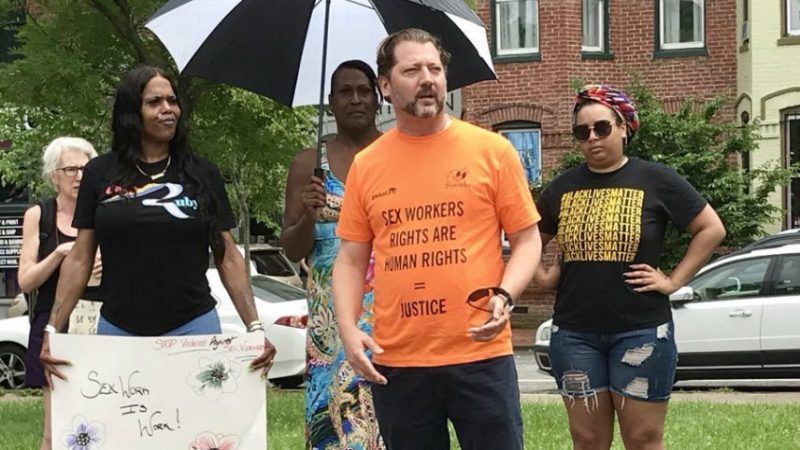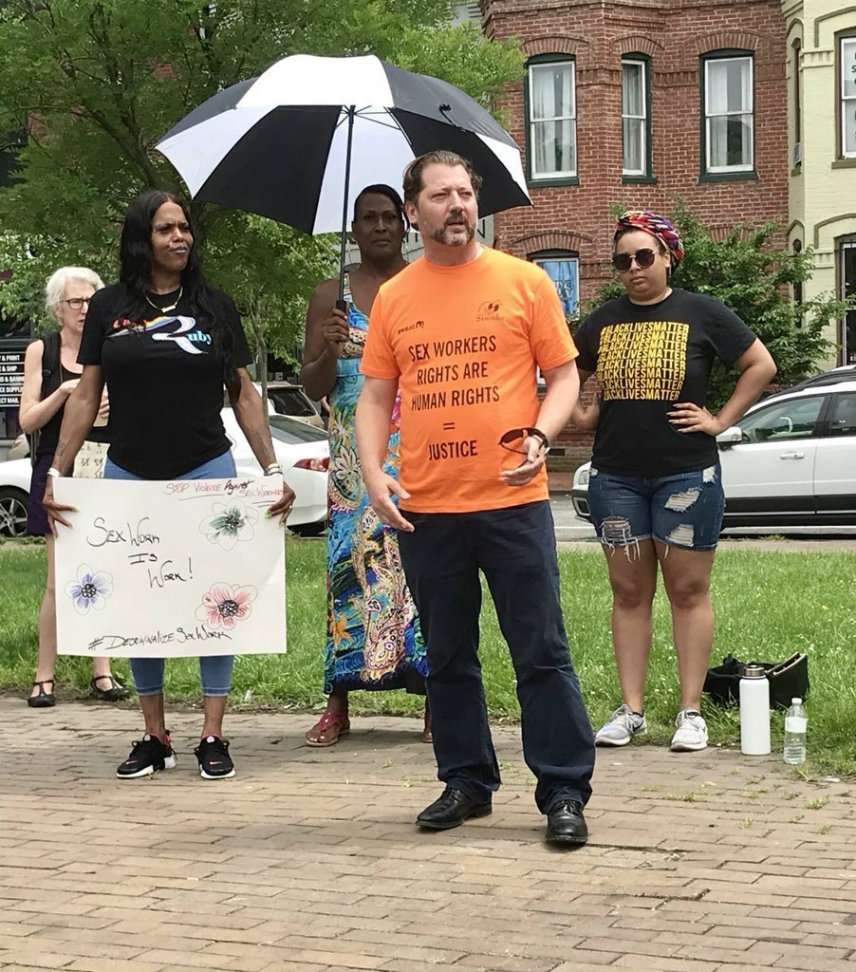D.C. Candidates Battle Over Decriminalizing Sex Work
With the D.C. primary approaching, candidates are quizzed on a bill that would decriminalize prostitution in the district.


The issue of prostitution decriminalization has divided candidates in the District of Columbia.
In October 2017, David Grosso, an at-large D.C. council member, drafted a decriminalization measure, called the "Reducing Criminalization to Promote Public Safety and Health Act of 2017." The bill would make the District of Columbia the first municipality in the United States to decriminalize prostitution—that is, to remove all criminal penalties for adults consensually selling or paying for sex. (In Nevada, where some counties have legalized prostitution, buying and selling sex is allowed but only under strictly regulated circumstances; those engaging in prostitution outside these circumstances can still be found guilty of a crime.)
As the majority Democratic city prepares to effectively determine its mayor and city council members in the upcoming June 19 primary, discussion surrounding Grosso's legislation has grown. Recently, candidates responded to a questionnaire from the Gay and Lesbian Activists Alliance (GLAA), a DC LGBT advocacy group, which included a question about the measure.
D.C. Mayor Muriel Bowser (D), who is seeking re-election, refused to provide a definitive answer about her position. "The issue of commercial sex, sex trafficking, and prostitution in general is highly complicated, generates a lot of responses, and requires careful consideration," said Bowser.
Bowser's Democratic-primary opponents—James Butler and Earnest Johnson—were split in their responses. Butler opposes the legislation, while Johnson supports it.
Overall, only 16 of 26 candidates replied to the questionnaire, including Martin Moulton, the Libertarian Party's candidate for D.C. mayor. Moulton not only supports decriminalization efforts but believes in expunging the records of non-violent sex workers and customers who have previous prostitution convictions.
Ed Lazare (D), a candidate for D.C. Council Chair, also responded in support of Grosso's legislation. "We should not jail people who have turned to sex work," said Lazare, "especially because discrimination and exclusion have prevented many from supporting themselves in the formal economy."
Lazare and Moulton join several other candidates, including Ward 1 council member Anita Bonds (D), in supporting Grosso's decriminalization effort. Lori Parker (D), former DC Superior Court Judge, and two other at-large council candidates oppose the legislation.
"The Council has amended the current law over the years (principally during my chairmanship of the Judiciary Committee 2005-2012) to recognize that sex workers are often the victims of trafficking and establish the penalties for first-time offenders as minor," said DC Council Chair Phil Mendelson (D), also seeking re-election, in reply to the GLAA questionnaire. Mendelson acknowledged his support for the bill's provision to "establish a task force to improve community safety and health through the lens of commercial sex."
GLAA President, Guillaume Bagal, told the Washington Blade, "I was pleased to see that many were open to sex work law reforms, but still disappointed at the conflation of sex work and trafficking displayed in many responses, and the lack of urgency in addressing the criminalization of individuals doing what they can do to survive."
The World Health Organization, UN Women, Human Rights Watch, and the Open Society Foundations have all publicly supported decriminalizing sex work. Amnesty International has endorsed Grosso's legislation. District voters have an opportunity to take public health and safety for sex workers to the next level. Will they take it?
Editor's Note: As of February 29, 2024, commenting privileges on reason.com posts are limited to Reason Plus subscribers. Past commenters are grandfathered in for a temporary period. Subscribe here to preserve your ability to comment. Your Reason Plus subscription also gives you an ad-free version of reason.com, along with full access to the digital edition and archives of Reason magazine. We request that comments be civil and on-topic. We do not moderate or assume any responsibility for comments, which are owned by the readers who post them. Comments do not represent the views of reason.com or Reason Foundation. We reserve the right to delete any comment and ban commenters for any reason at any time. Comments may only be edited within 5 minutes of posting. Report abuses.
Please to post comments


Wait, the whores in Washington are talking shit about the prostitutes? This is like the pot calling the other pot black. African-American, whatever.
If only the DC Madam could have lived to see this day.
Xaviera Hollander?
Even if Grosso's measure does pass the DC council, it still has to be approved by Congress, doesn't it? And we know how that story ends.
I think they have to make an effort to vote it down.
I would love to see this, but I suspect the whores in Congress probably don't want the competition.
There is no one in that pic that I would be willing to have sex with.
Stop being so fussy.
Am I missing something here? How in the world can DC outlaw prostitution when the Congress that meets there is full of prostitutes . . . too numerous to mention.
That the DC city council would even consider such a thing is laughable. What do they want to do? Cut off their nose to spite their face? If they'd follow through on this, we'd have no reason for the big shiny white neoclassical buildings there.
Candidate #1: "I think sex work is demeaning to women!"
Candidate #2: "I think no one chooses that kind of work, but it is the world's oldest profession for a reason!"
Candidate #3: "We should decriminalize it yesterday!"
Candidate #4: "My ho is in the audience tonight. Jasmine, stand up for the people. Don't worry, my wife is cool."
lol
Soliciting was a crime, but exchanges between consenting adults were not, in D.C. when I was there. I have to say that that made it vastly easier to be a Nice Girl who led a Clean Life. Jobs that involve marketing sex appeal (actress, receptionist, fundraiser, etc.) were legitimate jobs, not expected to be covers for something else. Just walking down the street while young and female was not turned into an excuse for harassment. There were generally accepted ways to find prostitutes and know which level they were on, and all the rest of us needed to do was avoid a few stupid mistakes like wearing sex-toy shoes. I cannot imagine why any woman in her twenties or thirties would want to live in a city that prosecuted the women who take so much heat off the rest of us. If D.C.'s become such a city, the sooner it can change that, the better.
When people are asked to use gut instinct to stop real but rare horrors, relying on racial stereotypes and other biases tends to rule.
Is that why the cops pulled a gun on my friend the day I moved him and his babby mamma into my town. It's strange how one of the other regulars at the Wellness Center died of a drug overdoes latter that night in the Wellness Center bathroom.